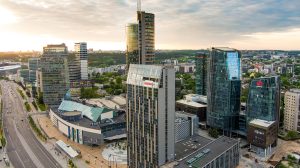Albin Kurti, the man widely expected to be Kosovo’s next prime minister, has said that negotiations with Serbia should not be centered on territory but on the rights of citizens and the needs of communities.
In an interview with the Financial Times, Mr Kurti said that he disliked the message that drawing borders along ethnic lines would send.
“Maps are racist, for sure,” he said.
Mr Kurti, whose Vetevendosje (Self Determination) party narrowly won a parliamentary election in October, has made it clear that once in office he will expect to lead negotiations with Serbia. Until now, the country’s president, Hashim Thaçi, has been Kosovo’s chief negotiator.
However, Mr Kurti, a former student leader who led non-violent demonstrations against Serbia at Prishtina University in the 1990s and later spent two years in prison on spurious charges of ‘jeopardising Yugoslavia’s territorial integrity’, told the BIRN Kosovo TV show Jeta ne Kosove last week that the Serbian and Kosovo presidents should no longer run the currently stalled EU-led dialogue between the two countries.
“Neither president should take part in negotiations concerning territory,” he declared. Both Mr Thaçi and his Serbian counterpart Aleksandar Vučić are believed to favour a deal that would involve exchanging predominantly ethnic Serb areas in northern Kosovo, such as Mitrovica, with areas of southern Serbia that are populated predominantly by ethnic Albanians, such as the Preševo Valley. The US and the European Union have tentatively given the nod to the idea, although German Chancellor Angela Merkel is firmly opposed.
“The territorial integrity of the states of the Western Balkans has been established and is inviolable. This has to be stated again and again,” Mrs Merkel said last year, betraying concerns, shared by many in the region, that redrawing Kosovo’s borders could lead to border revisionism in Bosnia.
Around 90 per cent of Kosovo’s 1.8 million people are ethnic Albanians. The country declared independence from Belgrade in 2008, and is recognised by more than 100 countries – including 23 of 28 NATO members – but not Serbia, Russia and a couple of EU members.
The EU has long made it clear that Serbia will not be allowed to become a member state unless it comes to an agreement with Kosovo.
Talks between the two countries all but came to halt late last year, partly as a result of Kosovo imposing high tariffs on Serbian imports. Mr Kurti’s new approach may offer a way out of the impasse. First of all however, he needs to ensure that he is confirmed as prime minister. Talks with the Democratic League of Kosovo (LDK), which came second in the election, have now dragged on for more than two months. There are already whispers in Prishtina that Mr Kurti’s failure to so far do a deal with potential coalition partners does not bode well for reaching what will be a far more complex agreement with Serbia.





[…] Źródło: emerging-europe.com […]
[…] the two countries have now been stalled for more than a year. Hope that a new government in Kosovo would kick-start talks have faded as the winners of Kosovo’s parliamentary election, held last October, have so far […]